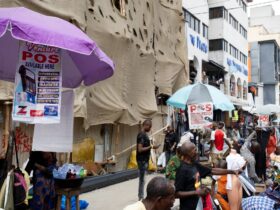Why Trump’s $100,000 H-1B Visa Fee Is Unlikely to Impact African Workers

President Donald Trump has recently enacted an executive order that raises the fee for hiring foreign professionals under the H-1B visa program to $100,000. This policy shift poses a significant challenge to the flow of tech talent from India and China but is anticipated to have a negligible effect on African applicants.
Under this new directive, U.S. companies must pay a $100,000 surcharge for each new petition filed to employ skilled foreign workers.
The administration argues that this measure will prioritize H-1B visa issuance to candidates possessing exceptional skills that cannot be substituted by American workers.
The announcement sparked diverse reactions among international technology executives, corporations, immigration specialists, and advocates.
While some voices raised alarms about the increased barriers for skilled professionals from developing regions seeking U.S. opportunities, others highlighted a potential upside: the policy might encourage multinational firms to expand remote hiring, thereby opening doors for African tech talent to engage in global projects without relocating.
However, statistical evidence tells a different story. In 2024, India dominated the list of countries with the highest number of approved H-1B visas, securing 71% of all approvals. China followed with 11.7%, while Nigeria was the sole African nation in the top ten, ranking tenth with less than 1% of approvals. Ghana was positioned 24th.
This data suggests that African professionals have historically had limited access to H-1B visas and thus will experience minimal direct impact from the new fee structure. Consequently, it is unlikely that global tech companies will pivot their recruitment focus toward Africa in response to this policy, instead continuing to rely heavily on talent from India and China.
USCIS statistics from 2007 to 2017 reveal that Indian nationals received over 2.18 million H-1B visa approvals, far surpassing China’s 296,313. No African country featured in the top 20 during that period. The fiscal year 2024 marked a milestone with Nigeria entering the top ten for the first time.
While the increased H-1B fee may alter global hiring dynamics, Africa’s marginal role in this visa category underscores a broader challenge: the continent must enhance its higher education systems to cultivate and retain advanced technical expertise, particularly in high-demand fields like artificial intelligence, to compete internationally.
Leading tech giants such as Microsoft, Meta, Apple, Amazon, and Google have been among the largest beneficiaries of the H-1B program and stand to be most affected by the fee hike. According to Reuters, Amazon secured 12,000 H-1B approvals, while Microsoft and Meta each had over 5,000 approvals in the first half of 2025.
These companies are pivotal players in the U.S.-China competition in AI development. A strategic response to the new fee could involve relocating AI research and development operations to countries where highly skilled talent is accessible without the hefty $100,000 charge.
Unfortunately, African nations are unlikely to be prioritized in such a shift. USCIS data from 2024 shows that 41% of initial H-1B approvals and 48% of renewals were granted to applicants holding master’s degrees, with an additional 12% and 6%, respectively, possessing PhDs. Bachelor’s degree holders accounted for 34% and 32% of approvals. This pattern reflects the hiring preferences of global tech firms, which increasingly seek candidates with advanced academic credentials.
While African students do pursue postgraduate education, relatively few specialize in computing disciplines compared to their peers in the U.S., India, and China.
For instance, during the 2023/2024 academic year, University of Ghana’s graduation report indicated that out of 17,535 graduates, only 2,620 (14.9%) were from the College of Basic and Applied Sciences, with just 530 earning master’s or doctoral degrees.
Similarly, at Makerere University in Uganda, the 2024 graduation ceremony saw 661 students (5.1% of the total 12,913 graduates) from the College of Computing and Information Sciences, with only 32 master’s and 2 PhD degrees awarded in that cohort (source).
AI companies are aggressively competing for candidates with advanced qualifications. Fortune reported in June that newly graduated PhDs are being offered multimillion-dollar signing bonuses. That same month, Wired revealed that Mark Zuckerberg assembled Meta’s superintelligence team by recruiting talent from OpenAI, Google, and Anthropic, most of whom hold advanced degrees from prestigious U.S. universities.

For Nigeria and other African nations to compete globally, they must cultivate a robust pool of highly skilled professionals. A White House report highlights that nearly 50% of AI-related PhD graduates in the U.S. are foreign nationals.
The report also notes that while the U.S. produces more AI graduates overall than most countries, India leads in AI-related bachelor’s degrees, and China excels in both bachelor’s and PhD degrees in AI fields. This explains why these countries have consistently dominated H-1B visa approvals for over a decade: they supply the talent global companies demand.
To emulate this success, African universities must evolve beyond traditional computer science and engineering curricula. They need to establish world-class faculties focused on emerging disciplines, with artificial intelligence as a priority.
Why emphasize AI? Because it currently attracts the most global investment and attention and is expected to remain a critical area for years to come. Moreover, these faculties must be flexible enough to adapt to future technological trends and prepare students to excel internationally.
Although many African institutions are beginning to offer AI programs at undergraduate and postgraduate levels, a significant obstacle remains: a shortage of qualified instructors. The relative novelty of these courses means the continent has yet to develop a sufficient cadre of experts capable of teaching AI at scale.
For Africa to close the gap and supply the caliber of talent sought by global firms, universities and governments must seize this moment to invest strategically in human capital development.
First, recruiting international specialists to lead AI and related programs is essential to ensure curricula meet global standards. This may involve attracting professors from leading institutions in India, China, and the U.S.
Second, fostering international exchange initiatives will allow African students to gain practical research experience abroad and return equipped with cutting-edge skills.
Implementing these approaches will position Africa as a credible source of top-tier technology professionals in the years ahead.
Until such investments are made to elevate the quality and quantity of skilled graduates, African workers will continue to face challenges competing with peers from other regions.








Leave a Reply